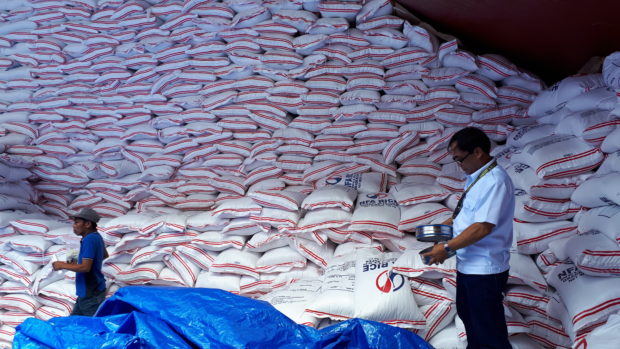MANILA, Philippines — Senator Francis Pangilinan on Monday warned of the “double whammy” effect of President Rodrigo Duterte’s new executive order temporarily reducing tariff rates for rice, adding that he is looking into filing a joint resolution for its withdrawal.
“Patay na naman ang rice farmers natin. Dapa na ang ating mga magpapalay dahil sa tuloy-tuloy na pasok ng imported rice. Sumubsob pa dahil sa pandemya. Ngayon, parang ililibing na sila sa hirap sa ulat na pagbaba ng taripa,” Pangilinan said in a statement when sought for comment on the President’s Executive Order (EO) No. 135.
(It will kill our local rice farmers. Our rice farmers are at the losing end as more imported rice enter the country. They are already feeling the effects of the pandemic, Now, they’re being buried with reports that tariffs are being lowered.)
RELATED STORY: Duterte orders new tariff rates for rice, pork
Under the order, the most favored nation (MFN) tariff rates for rice will be temporarily reduced to 35 percent, from 40 percent for in-quota imports and 50 percent for out-quota imports, according to Malacañang.
“Double whammy sa ating mga magpapalay. Mababawasan na ang RCEF (Rice Competitiveness Enhancement Fund) para sa kanila, dadami pa ang kalaban nila sa merkado. Pahirap talaga,” the senator went on.
(This will have a double whammy effect on our rice farmers. Their RCEF will be lower, and they will have more competition in the market. This is torture.)
On questions about the powers of the President to lower tariffs two days before Congress resumes session, Pangilinan said he is looking into filing a joint resolution seeking the withdrawal of the executive order.
Pangilinan, who formerly served as presidential adviser on food security in the previous administration, stressed that rice inflation has been low for the past seven months: October 2020, -0.5 percent; November 2020, -0.1 percent; December 2020, 0.1 percent; January 2021, 0.1 percent; February 2021, 0.5 percent; March 2021, 0.9 percent; and April 2021, -0.3 percent.
“Bakit magbababa ng taripa kung ang economic managers mismo nagsabi sa pagdinig natin sa presyo ng baboy na steady ang supply ng bigas?” the senator asked.
(Why do we need to lower the tariffs when our economic managers themselves have said in one of our hearings regarding the price of pork that the supply of rice is steady.)
According to him, Filipino rice farmers have been calling him up asking for his intervention on this recent executive action.
“Parang sa usapin ng pagbaba ng pork import tariffs sa ating mga magbababoy, hindi ba ulit dumaan sa konsultasyon ang polisiyang ito sa mga apektadong magsasaka?” he added.
(Just like in lowering pork import tariffs, did this rice import policy also not go through consultations with affected farmers?)
Further, he pointed to a bigger problem with the continuing liberalization of food and agricultural products.
“Apektado ng pagbaha ng mga imported na pagkain ang ating kakayanang mag-produce ng sarili nating pagkain [Flooding the market with imported rice will affect our ability to produce food locally]. Our rice sufficiency level dropped from 95 percent in 2017 to 79.8 percent in 2019. We don’t have the figures for 2020 yet,” he said.
“Pag bumaba ang kita o hindi na kumikita ang magpapalay, di na siya magtatanim. Pag di na siya nagtanim, lalo tayong nakaasa sa imported. Pag ganyan, hawak na ng ibang bansa ang pagkain natin,” Pangilinan explained.
(If the income of rice farmers is lowered or they have no income at all, they will be forced to stop. If they stop, we will become more dependent on imported rice. If that happens, that means other countries will now have control of our food supply.)
Malacañang said the new EO on rice tariff rates was intended to “diversify the country’s market sources, augment rice supply, maintain prices affordable and reduce pressures on inflation.”
It said the tariff was reduced following the rise in global rice prices and “uncertainties” regarding the steady supply of rice in the country.
The measure taken was recommended by the National Economic and Development Authority board, it added.


